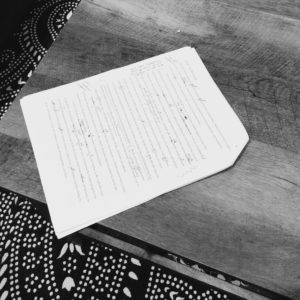
Hey world. It’s 6am, the clocks just changed, the election is on Tuesday, and my kid doesn’t care about the time change so I’m anxious and up! You? I’m too lazy to cook breakfast right now and the littlest person in the house is still sleeping, thank goodness, so let’s talk about workshop!
(But first, hello to my friends and family that just discovered my website! I love you all!)
So, workshopping! Last spring I enrolled in an Advanced Fiction writing class, because there was no “I’m totally new and have no idea what I’m doing class” and because I had already written a book’s worth of words. I won’t say I had written a book, per se, because that book (Mosiac- check the Mosiac page to learn more!) was still incredibly rough at that point. Heck, it still is. But I had 80,000 words and a general story, so I figured I might as well try an advanced class. I like a challenge. I also thought it was sink or swim time. If I had no writing ability this was the time to find out.
I went into the class fearing one thing: that the teacher and/or students would say or imply that I was completely hopeless and needed to leave. Thankfully, that didn’t happen. The class was a workshop model, meaning we were each expected to submit work for our classmates to read and critique. During each workshop the writer had to sit silently for 30 minutes while everyone else in the class picked apart their writing and provided constructive criticism. I know, right?!? Scary! Luckily, I started class with such a low bar (Just don’t tell me I’m horrible and kick me out!) that I was surprised to find that I really LIKED being workshopped. The feedback was helpful, honest, and I even got some really reassuring comments on my actual ability. My favorite? “You’re a really good writer but this chapter is boring.” (Thanks, Ron!) I figured if these honest strangers thought I had potential, then that was good enough for me. I just needed to do the work and make the story better.
Turns out that’s just how writing works. You have to trust yourself to craft a story, then you have to give yourself (and ideally other people, too) permission to rip it apart so that you can piece it back together into something that flows better, is more exciting, or has fewer weasel words (I didn’t know what that meant either.) I’m in my second class now, which is focused on developing good first chapters, and there’s such a difference between what I wrote a year ago and the work I’m doing now. I’ve also made some writer friends and learned a lot from workshopping their writing.
The best way to become a better writer is to write, write, write, but at some point, most people need other eyes on their work to point out the things that are hard to see up close. I’m very thankful that I’ve found people who are willing to help me do just that.
Now that we are in our second NaNo together (already? how has it been a year since last year’s?) I have to say I am so impressed with how much you have done in the past year.
I am a long-time NaNo participant but always struggle in the off-season to stay motivated and the idea of swapping 100% original work with multiple people for the purpose of them telling me what I am doing wrong is scary. I hope this year that I will get my act together and to reach out to do some of the things you have been doing.
Also – I am impressed by you staying on par while parenting and blogging most days. Good luck the rest of the month. 🙂